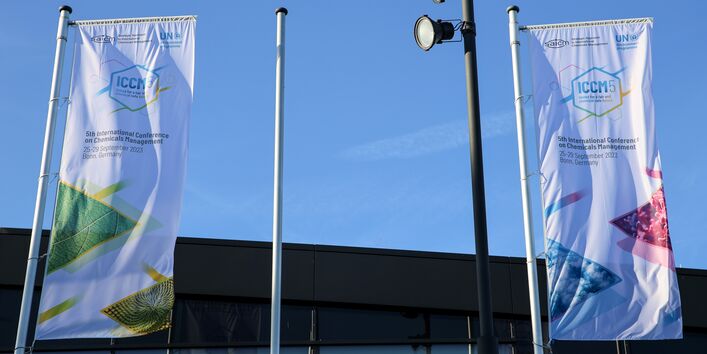New Global Framework on Chemicals adopted
The Global Framework on Chemicals (GFC) adopted at the fifth International Conference on Chemicals Management (ICCM5) in Bonn sets concrete targets and guidelines for the entire lifecycle of chemicals. In addition to this framework, the conference also adopted the Bonn Declaration, in which ministers and delegation leaders committed to the implementation of the GFC.
Following a week of intense negotiations, ICCM5 ended a day late on 30 September 2023. The expectations were high, as SAICM, the prior political approach of the United Nations Environment Programme, didn’t have the desired effect: The goal set for it – minimising adverse effects of chemicals on human health and the environment by 2020 – was not achieved. That’s why, since 2015, steps have been taken towards a strengthened global framework for the sound management of chemicals and waste.
The adoption of the new Global Framework on Chemicals (GFC) means that countries and stakeholders could agree on a roadmap towards globally sustainable handling of chemicals, including products and waste throughout the entire lifecycle. Since GFC is the successor, rather than a replacement, of SAICM, well-proven processes and instruments can be retained.
The new framework has 28 targets relating to five strategic objectives and are much more concrete than under SAICM. These targets compass several obligations, for example to create the necessary legal and institutional mechanisms, make data and information available, address issues of concern, implement safe and sustainable alternatives, and develop capacities to increase cooperation and ensure adequate funding.
Most of the targets are set to be implemented by the year 2030 and thus conform to the 2030 Agenda for Sustainable Development. This takes account of the fact that the goals (SDGs) of the sustainability agenda can only be achieved by sound management of chemicals. The signatories of the GFC explicitly recognise pollution from chemicals as the third global environmental crisis of our time, alongside climate change and loss of biodiversity.
In addition to the framework, ministers, delegation leaders and stakeholders signed a high-level policy statement, the Bonn Declaration, in which they committed to the goals of the GFC and thus the implementation of the new framework. The Bonn Declaration sends out an important political signal for globally responsible management of chemicals.
The GFC includes important new elements that were lacking with SAICM: Instead of the one general 2020 target, it includes thematic and time-bound targets whose implementation is to be made measurable and comprehensible using indicators. In addition, the organisations united under the Inter-Organization Programme for the Sound Management of Chemicals (IOMC) are set to take on a more active role in the implementation of the GFC, thereby ensuring stronger connections to other policy areas such as occupational health and safety.
It is now a matter of implementing the agreed targets in resolute cooperation between the concerned actors and sectors so that the vision of the new GFC can be made reality: A planet free of harm from chemicals and waste.

